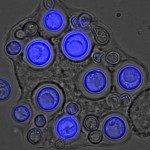Link to Pubmed [PMID] – 32604018
Link to DOI – S1369-5274(20)30065-510.1016/j.mib.2020.05.005
Curr. Opin. Microbiol. 2020 Jun; 58(): 24-31
Although soluble mediators of our innate immune system have a substantial impact on invading microbes, their role against fungal pathogens has been underexplored. Constituting the humoral immunity, soluble mediators comprise the complement system, collectins, acute-phase proteins, antibodies and antimicrobial peptides. These components can prevent fungal infection either by directly interacting with invading microbes, leading to their aggregation (microbistatic), destruction (microbicidal) or linking them to cellular immunity. The composition of soluble-mediator varies with human body-fluids, resulting in different antifungal mechanisms. Moreover, cellular immune system deploys both oxidative and non-oxidative mechanisms to destroy extracellular or internalized fungal pathogens; however, cellular immune activation is mainly influenced as well as regulated by soluble mediators. This review outlines the antifungal mechanism employed, directly or indirectly, by soluble mediators, and in response, the evading strategies of the fungal pathogens.




